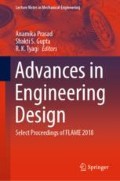Abstract
The importance of impact problems has led to extensive research work over the years. In an impact phenomenon, the material is subjected to very short duration high force levels resulting in large plastic deformations and significant temperature rise. One of the most common phenomena of the impact problem is the occurrence of fracture. Fracture occurs when the velocity of impact is very high. In metal, it will lead to ductile fracture. Ductile fracture generally takes place due to void nucleation, then the growth of the nucleated voids and at last voids coalescence to form a micro-crack. A number of studies on ductile fracture and damage simulation in static condition have been carried out using this approach. But, there is a limited study on the prediction of fracture in impact problems. In impact problems, the effects of strain rate, stress triaxiality, and temperature on material behavior become significant. In the present work, damage growth, and effect of high strain rate are studied for ductile fracture during the high-velocity impact of cylindrical tubes using commercial finite element (FE) software ABAQUS/Explicit using continuum damage mechanics (CDM). It is shown that CDM-based modeling is able to capture the failure of the tubes.
Access this chapter
Tax calculation will be finalised at checkout
Purchases are for personal use only
References
Clifton RJ (2000) Response of materials under dynamic loading. Int J Solids Struct 37(1–2):105–113
Gautam SS, Dixit PM (2012) Numerical simulation of ductile fracture in cylindrical tube impacted against a rigid surface. Int J Damage Mech 21(3):341–371
Johnson GR, Cook WH (1985) Fracture characteristics of three metals subjected to various strains, strain rates and temperatures and pressures. Eng Fract Mech 21(1):31–48
Lemaitre J (1985) A continuous damage mechanics model for ductile fracture. Trans ASME: J Eng Mater Technol 107:83–89
Dhar S, Sethuraman R, Dixit PM (1996) A continuum damage mechanics model for void growth and micro crack initiation. Eng Fract Mech 53(6):917–928
Wang B, Lu G (2002) Mushrooming of circular tubes under dynamic axial loading. Thin Walled Struct 40(2):167–182
Author information
Authors and Affiliations
Corresponding author
Editor information
Editors and Affiliations
Rights and permissions
Copyright information
© 2019 Springer Nature Singapore Pte Ltd.
About this paper
Cite this paper
Bora, D., Kumar, M., Gautam, S.S. (2019). Continuum Damage Mechanics Based Simulation of Ductile Fracture of Cylindrical Tubes. In: Prasad, A., Gupta, S., Tyagi, R. (eds) Advances in Engineering Design . Lecture Notes in Mechanical Engineering. Springer, Singapore. https://doi.org/10.1007/978-981-13-6469-3_6
Download citation
DOI: https://doi.org/10.1007/978-981-13-6469-3_6
Published:
Publisher Name: Springer, Singapore
Print ISBN: 978-981-13-6468-6
Online ISBN: 978-981-13-6469-3
eBook Packages: EngineeringEngineering (R0)

